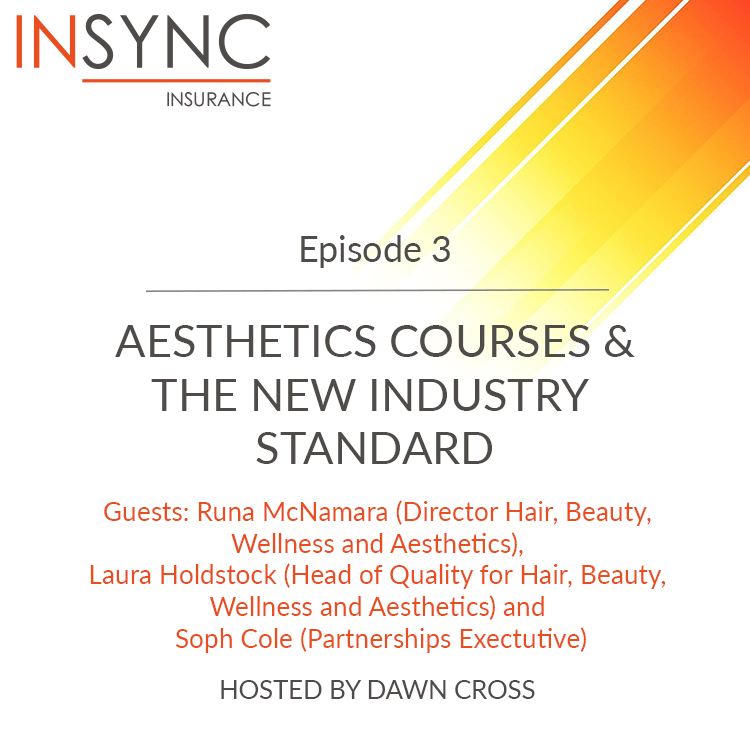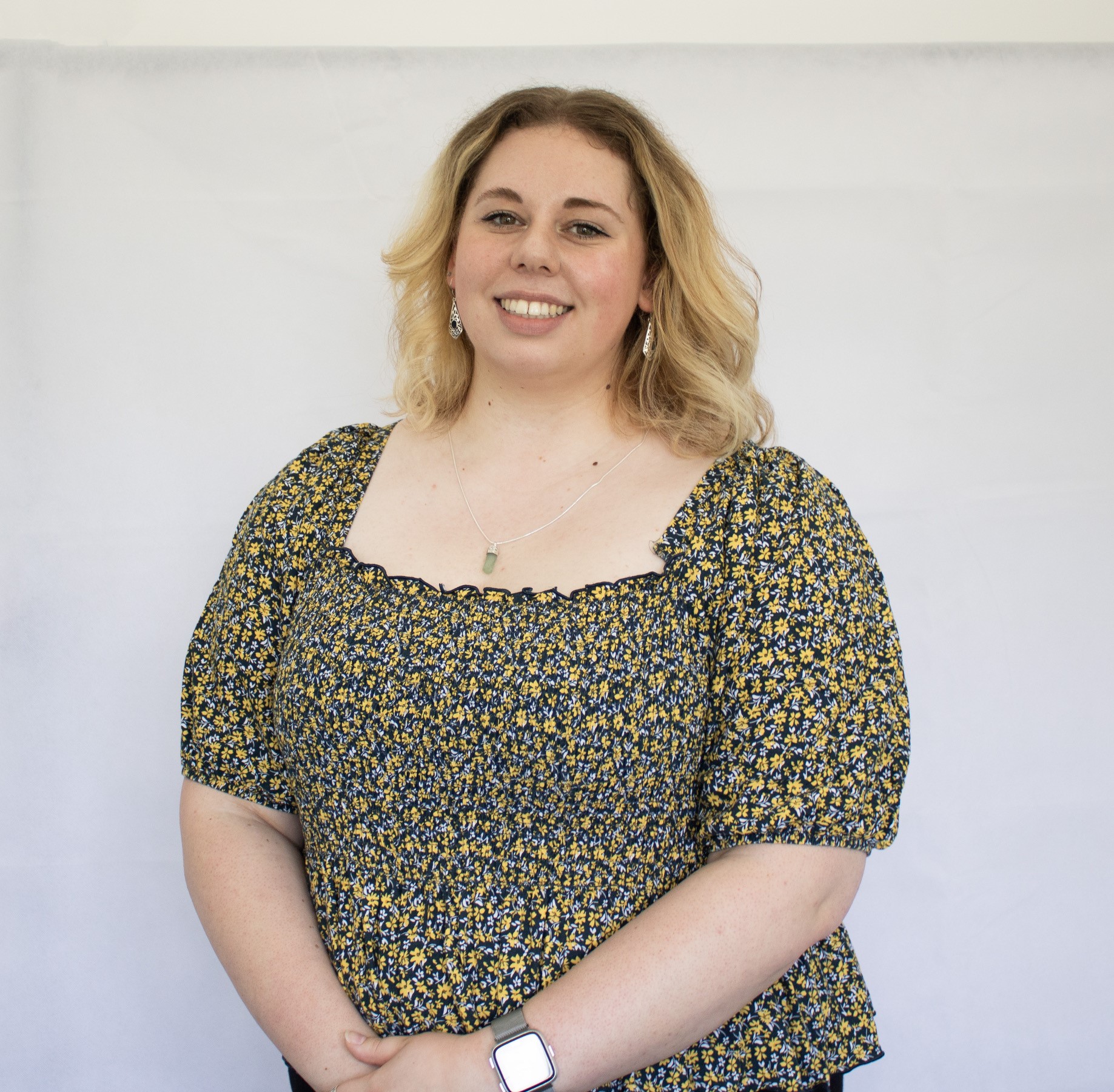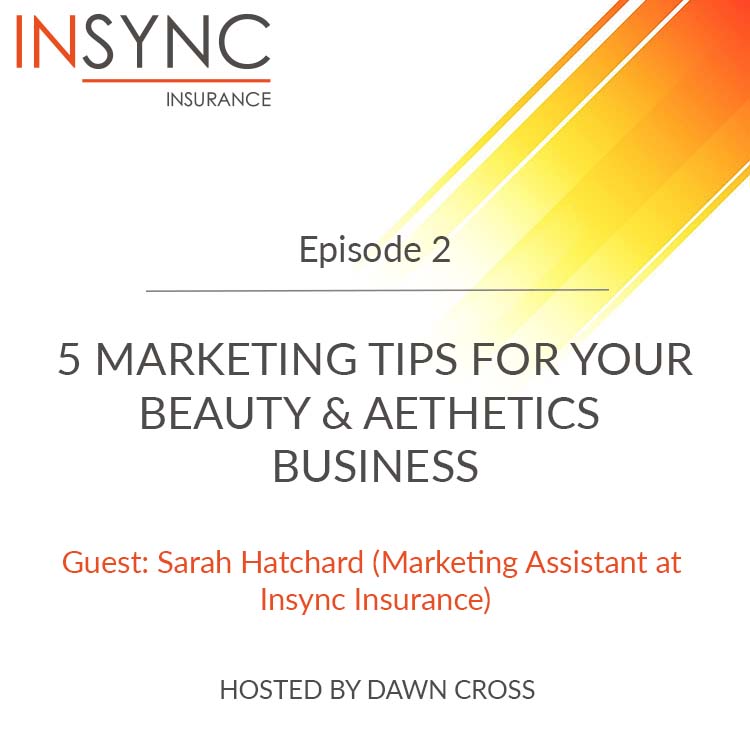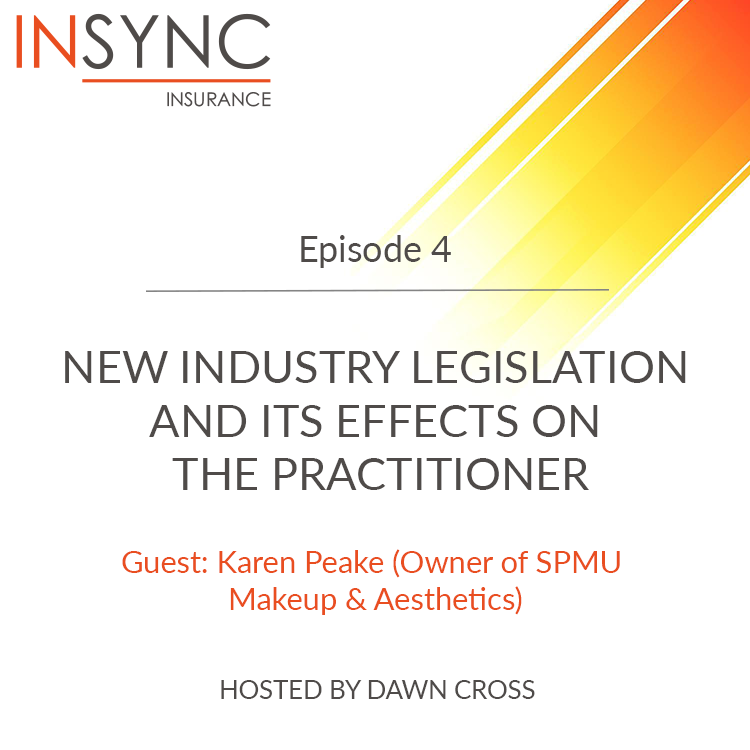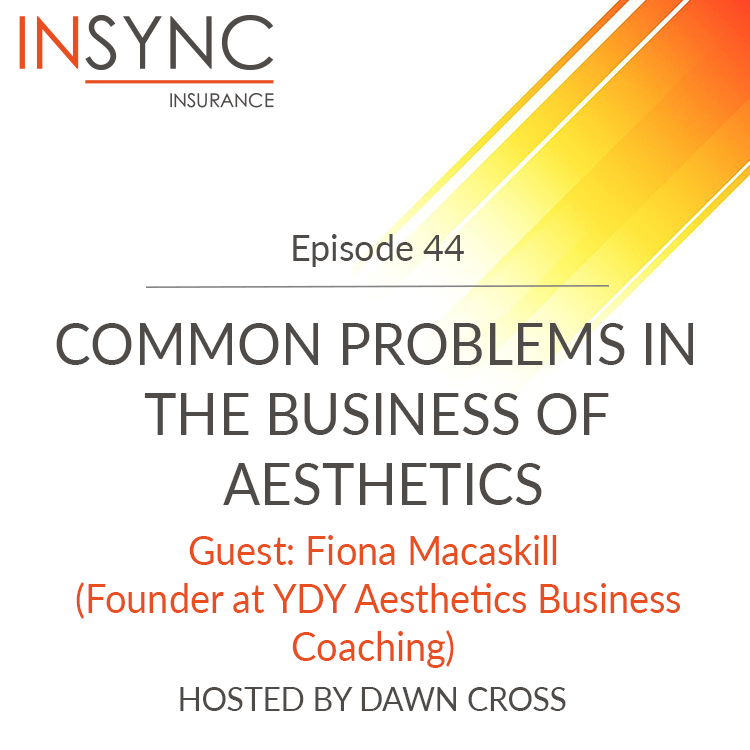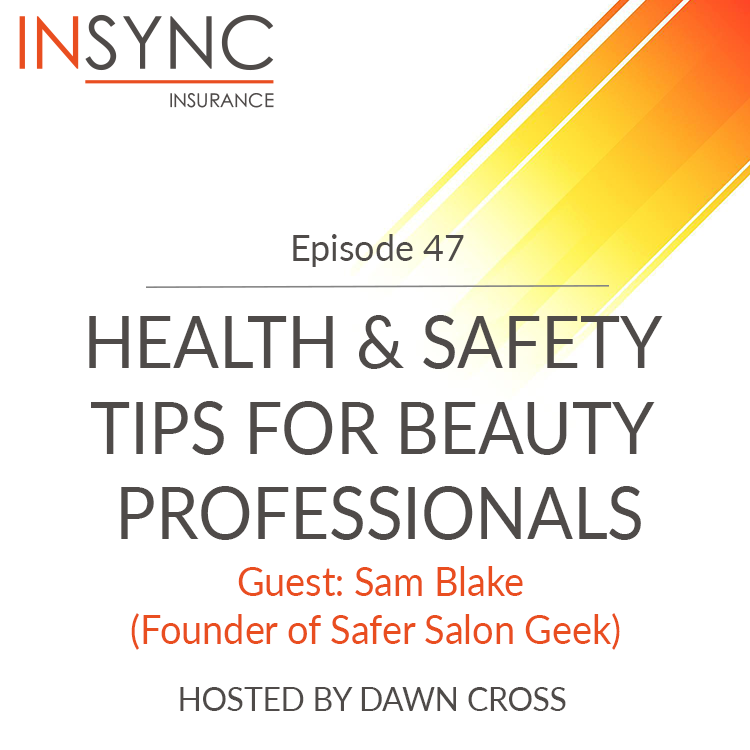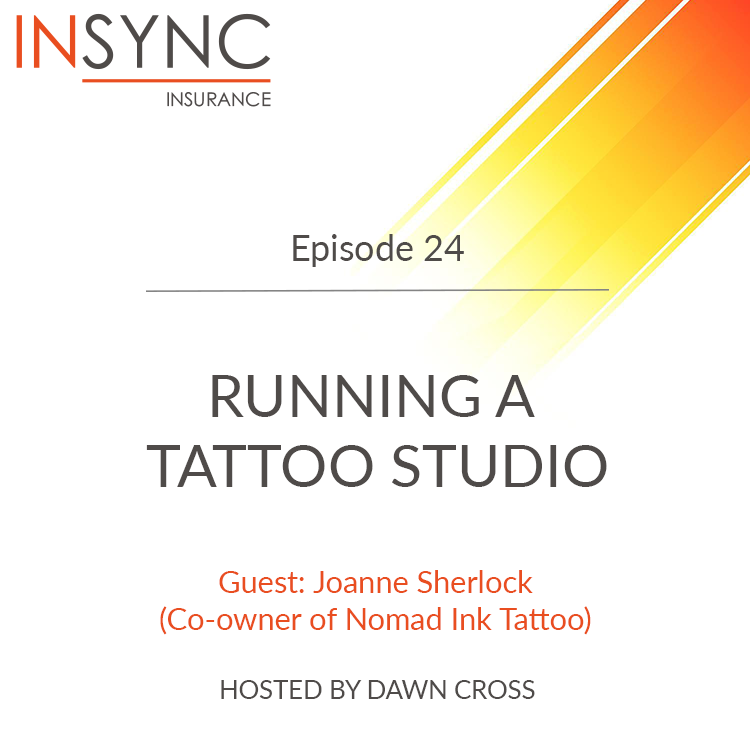Episode Transcript
Speaker 0 00:00:00 Welcome to the Insync Insurance Podcast. I'm your host, Don Cross, and today we'll be covering aesthetic courses and the new industry standard. Here today we have guests, Laura Hardstock, una McNamara, and so Cole to discuss this and provide insights into the industry. So let's get into it. Could you introduce yourself, Laura?
Speaker 2 00:00:25 Um, my name's Laura Hol stock. I'm head of quality for Hair, beauty, wellness, and Aesthetics with qualify.
Speaker 0 00:00:34 Brilliant. And Rina, could you introduce yourself?
Speaker 3 00:00:37 Yes, I'm Rina McNamara. I'm director for Hair, beauty, wellness and Aesthetics for qualify limited awarding organization.
Speaker 0 00:00:45 That's okay. Sorry. Um, and Sophie, if you could introduce yourself.
Speaker 4 00:00:49 Yep. Uh, so I'm Sophie Cole and I'm a partnership executive in Sink Insurance.
Speaker 0 00:00:54 Brilliant. And I am the host on cross. So we're here today to discuss, um, about aesthetic courses and, uh, basically what qualify gets up to, uh, what is an aesthetics course?
Speaker 2 00:01:08 Well, there, there are a number of different aesthetics courses out there, but, um, we offer qualifications, which are regulated qualifications, and we have the level five certificate in aesthetic practice, which covers microneedling and, uh, medium grade peels. And we also have a level seven certificate in aesthetic practice, which deals with, uh, injectable treatments, which would be your botulinum toxins or your dermal fillers.
Speaker 0 00:01:36 What advice would you have for beginner estheticians?
Speaker 2 00:01:42 If you decide that this is the course you want to take? Uh, you need to really do a bit of research on the center that you go to for your training and make sure that they're offering the qualifications that you need to get the relevant insurance that you need. They should be checking your prerequisites. So this means what qualifications or experience you've had before starting this training. So usually we would be looking at someone who had the, uh, relevant qualifications or, uh, equivalent qualifications within the sector to a minimum of a level four. Um, and these would be regulated qualifications as opposed to just your C p D qualifications or depending on your background. Um, it could be three years experience, um, with, um,
Speaker 2 00:02:35 The skills that you are thinking about or with other associated beauty therapy and aesthetic skills. Or you could be a medic or you could be a professional. You also need to have a really good understanding of, uh, the skin and facial anatomy for, um, to, to make sure that you are not being set up to fail. You need to have that underpinning knowledge to make sure that you feel safe and happy to carry out the treatments and you know exactly what's going on and what I would say, so just, just a minute ago I said that, um, you need to choose the right place. So I would recommend that you look at at least two or three training centers in your area. Um, you need to really have a look at their website, phone them up, have a chat, um, ask them, uh, as many questions as you can think about, ask them if you can come into the center, have a look around, maybe meet some other learners, even be a model if you feel happy enough to make sure their facilities are nice enough, are good enough for you, um, and you can see that people are happy, um, ask about the support that you'll get throughout the course to make sure that you have picked the right course for you.
Speaker 0 00:03:58 Uh, so Rina, I've got now a question for you. What's the difference between a regulated course and for example, like a C P D course?
Speaker 3 00:04:08 Hi, Dawn. Yes. The, um, differences between a regulated and a and an accredited course is that a regulated qualification is delivered by an awarding organization that is off qual regulated. So qualify, um, have been regulated by and accredited by off qual. Um, the qualifications that we deliver, or rather that our centers deliver that we, we, uh, prepare for the centers to deliver have been, um, they've gone through an off qual audit and checks as an awarding organization. We are checked, we also link in with any, um, organizations that, uh, we need to like the J C C P or haer, our qualifications also align to the National Occupational Standards. Um, and then once they are recognized by OWA and uploaded onto what is referred to as the R Q F, which is the regulated qualification framework, then we know that those qualifications, um, have been recognized by offal who are the government body for, they are the office for, uh, qualifications.
Speaker 3 00:05:20 So they have to meet a, a desired standard. Uh, as I said, we are audited by offal and each qualification has what's referred to as a unique qu uh, a qualification accreditation number. And people can check these qualifications up. So they could go onto to the register, which is the register.off qual.gov, do uk and then they can look up the awarding organization, they can look at the qualification and they can note that it's been through those rigors that, um, an awarding organization would've made sure that they've met. Now that compared with an accredited course, um, accredited, there are various bodies that will accredit training and very often accredit training for insurance. Um, and when they're accredited, that, uh, organization might look at what's involved in, uh, the delivery of the program. The program is usually the center's own program. Uh, they might rubber stamp if you like, their own training, but actually they might not ever quality assure that program from there on afterwards.
Speaker 3 00:06:33 Whereas with the regulated qualification, we carry out e external quality assurance, first of all at the approval process, but then annually and regularly, uh, to check that every learner going through that qualification is doing. So knowing that they are meeting the standards that are set within the qualification. So every, every center delivering that regulated qualification will be following those same standards, which in our case are the qualify standards. Uh, because we've written the qualification, we've written the assessment criteria, we, um, provide the centers with how they should, um, assess the information on how they should assess those qualifications and the criteria for, um, judging or marking, um, short answer questions or any assessment criteria that's within that qualification. So the centers do go through this rigorous process and con are continually checked. Every learner is checked before the certificated. They're checked not only by their assessor, but they have to have a, a qualified internal quality assurer. And then there is the sampling through the external quality assurance, very different from an accredited program, which might be rubber stamp to start with and never seen again. And that's not in all cases. And it's actually not to say that the course might not be good, but it just doesn't meet those regulated, um, requirements that offal and awarding organization would require.
Speaker 0 00:08:13 Brilliant. It's really, um, refreshing to hear that, you know, it's a regularly checked rather than it just being that one bit at the beginning and then that's it. They're like, well, we must be good instead of, you know, continuing checkin check-ins. That's really reassuring to hear, uh, that you guys are just so on it, you know, that's, um, absolutely amazing. I was wondering as well, um, if we could discuss a bit more about, uh, what are the risks associated with taking a course, um, that's not for regulated qualification.
Speaker 2 00:08:45 So if you pick a course that is not a regulated qualification, you do not know as Rona said that, that the standards that have been approved for that qualification or, or that training. When we check out a center, we make sure that the trainers are fully qualified in what they have to teach. And like you, you were saying earlier, Dawn, um, it's really, really good that we, we go and check and trainers change, so we have to keep an eye on and they, and they have to let us know if there's been an update in a new trainer or, or, um, new experiences or changes to insurance, et cetera. We, we have to monitor that, and that's part of our quality assurance process. You don't always know that if you're not on a, if you're not on a regulated, uh, qualification course. Um, and that can be a little bit tricky.
Speaker 2 00:09:42 Um, it's really important to also see that all of the products and equipment are cece certified or have a license for marketing for use in the uk. This is really, really essential. And it goes back to one of the first questions you said about picking your course. You know, ask the center what products they're using and have a look online to make sure they are, you know, the real deal and not just bought online and in some, um, online shop, uh, from China, no offense to China, but you know what I mean. Um, uh, so that, so as I'm saying like, uh, the, the products are bought from a, a reputable, uh, UK pharmacy or distributor. So as I just said, the center should be able to give you this information and it shouldn't be anything that you have to really fight to get this, this information should be freely available and often on the websites they will tell you what products they use anyway, so you can do a bit of research.
Speaker 2 00:10:44 So when it comes to the unregulated qualifications, you can't always guarantee that they are using what they say they're using or, um, that you are getting what you're paying for. And the other thing you need to be a bit careful of is if a, if an unregulated qualification states it has a level that isn't always, that isn't true because unregulated qualifications aren't leveled in the same way as regulated qualifications are. So you need to be careful when you are reading, um, the information that's being shared with you to make sure that it is what it says on the tin and you're not being misled in any way.
Speaker 0 00:11:28 No, that's definitely key, uh, to do research. I mean, you know, when you're doing anything really in life, you tend to do a bit research but with something that, you know, you want to do a profession and it's so important to double check and check again that everything's up to snuff
Speaker 2 00:11:45 And it is, it's such a high risk, uh, treatment as well. So you need to make sure that you're doing it if you are having it done to yourself. You would hopefully do quite a bit of research before you went to a practitioner to make sure that they were suitably qualified and that they were, uh, you know, had a a, a prescriber on site and that they had good products, you know, regulated products or certified products before going in and having treatment. I certainly would if I was going to have, um, botulinum toxin or uh, dermal fillers put into my body, to be honest, <laugh>.
Speaker 0 00:12:24 That's right. So, um, in terms of a student, um, looking at courses and everything else, what could be the impact? For example, if they took a course that wasn't regulated or, um, basically just didn't meet the standards, if that makes sense?
Speaker 4 00:12:41 Yeah, so if a course didn't meet the standards, it would mean the student wouldn't be able to gain their insurance. Obviously insurance is such a massive part of this profession. It needs to be there, um, regulated courses to be UK accredited. This is so that again, the student can gain insurance. So going back to what Laura said, it is so important to really check and check again that you know, where you are gonna be, training is the right place to do so. Um, but yeah, as long as everything's above board, you are happy and as long as you know you've done your case studies, it's face-to-face, then we are happy to.
Speaker 0 00:13:21 That's brilliant. Is there any, um, specific qualifiers or pointers that they need to meet in terms of, um, gaining insurance with us? Do you know
Speaker 4 00:13:32 So many aestheticians are applying for insurance within saying it will be assessed on a case by case basis? We just need to check that their qualifications and experiences are relevant and at the appropriate level to the treatment that they are wanting to offer in the future and that they want their insurance for. Um, we do understand there is a rigorous entry training and assessment criteria to achieve a regulated aesthetics qualification anyway, and because of that, NSYNC will be providing a discount, um, for anyone who does come through for qualify holding one of their certificates. This will be at 10% for a level five and 20% for a level seven.
Speaker 0 00:14:07 Brilliant. That's so key to know as well. So if there's anyone listening that, uh, um, maybe at the very beginning of your journey where you're kind of looking into courses or maybe actually you are looking to ready to start getting out there, I think that's really key to know. Um, if you were looking to get your in sync, um, ah, looking to get your insurance through in sync, it's, it's always a tongue tie when it, when I have to say the company name and uh, <LAUGH> Radio. Um, so my last question of the episode is kind of why is it important to find the right course? I feel like we've maybe hit this on nail on the head already, but maybe if there's anyone else wants to add anything
Speaker 4 00:14:48 <laugh>
Speaker 0 00:14:49 Go for it.
Speaker 3 00:14:53 Um, yes, just to say that when a center goes through, um, the initial approval process with an awarding organization, we actually ask for the CVS and all of the certificates as well as, uh, wanting to know the experience of every trainer, every internal quality assurer, and anybody else that might be associated with the training for that learner. So Laura mentioned about the, uh, products and the equipment, but it's also really important that you know that the people who are training you have been thoroughly vetted on and know what they're doing. Because unfortunately, you know, if you learn how to do something badly, then you're not knowing, you don't know it's bad. It's only when you actually, uh, are taught correctly and able to, uh, provide those treatments correctly that you are going to be safe out there for the, for the general public. Uh, and you know, anybody going to, um, a a a provider of these services really should be asking what qualifications that practitioner has.
Speaker 3 00:16:00 So, you know, I think that's just one of the emphasis. And it is very difficult because we use these terms accredited and regulated and, and not everybody does understand the differences between the two. You can have accredited courses that are C P D and sometimes people will refer to an accredited course, which is a regulated qualification. But just as I mentioned before, there is that difference. There is that ongoing quality assurance and that reassurance therefore that people are, you know, fit to be in the industry, able to reassure the, the general public that the provision of the services meet the highest standards possible. And we will always strive to make sure that if standards change, for example, qualifications are updated as well, they're not static, they're only live for about three to five years. And at the end of that period, or even beforehand, if something came in, if there was a, a new rule or for example covid, you know, no, none of us could imagined covid three years ago. And yet now with the war with our qualifications part and parcel of the checks is to check that there is that covid safety within the premises.
Speaker 0 00:17:15 Cool. Well thank you everybody for coming on to discuss this. It's very, I think it's very key and hopefully great and we can help educate a lot of people who are a bit uming, an eyeing about the industry and not quite sure what kind of courses and hopefully this'll be a good kind of um, uh, starting point for a lot of people as well. Well, um, thank you everybody for joining in on this podcast. I think so.
Speaker 3 00:17:41 Thank you.
Speaker 0 00:17:42 Thanks for having us. It's alright. Thank you. If you'd like to know more, head to our website, nsync insurance.co.uk where we have more on our blog with posts written by brilliant experts. I have been your host, Dawn Cross and Chin next week for another episode. NSYNC is one of the UK's fastest growing insurance providers offering comprehensive cover for SMEs and the self-employed throughout the uk. Our expert team can tailor your insurance to meet your individual business needs and compare prices from our lois of London approved partners.
